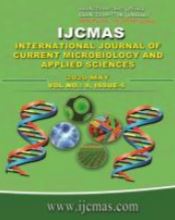


 National Academy of Agricultural Sciences (NAAS)
National Academy of Agricultural Sciences (NAAS)

|
PRINT ISSN : 2319-7692
Online ISSN : 2319-7706 Issues : 12 per year Publisher : Excellent Publishers Email : editorijcmas@gmail.com / submit@ijcmas.com Editor-in-chief: Dr.M.Prakash Index Copernicus ICV 2018: 95.39 NAAS RATING 2020: 5.38 |
The present study was conducted on technological gap in adoption of recommended practices of loose flowers in Tamil Nadu. The study was carried out in Krishnagiri, Salem and Tiruvannamalai districts of Tamil Nadu. Six villages (2 villages from each district) were selected based on the criteria of maximum area under rose, Chrysanthemum and Tuberose cultivation. 40 farmers were randomly chosen and thus 120 respondents from three districts has been chosen. The findings revealed that, among the various recommended practices the maximum gap were observed in recommended varieties of tube rose ( 100.00%) chrysanthemum- MDU 1(95.00%), bud capping and yellow trap (75.00 %) , control measure of powdery mildew (75.00%) and black spot disease in rose. Further, lack of awareness about the recommended varieties, lack of availability of skilled labours and high cost in adopting the practices were expressed as reasons for technological gap in loose flower cultivation.
 |
 |
 |
 |
 |